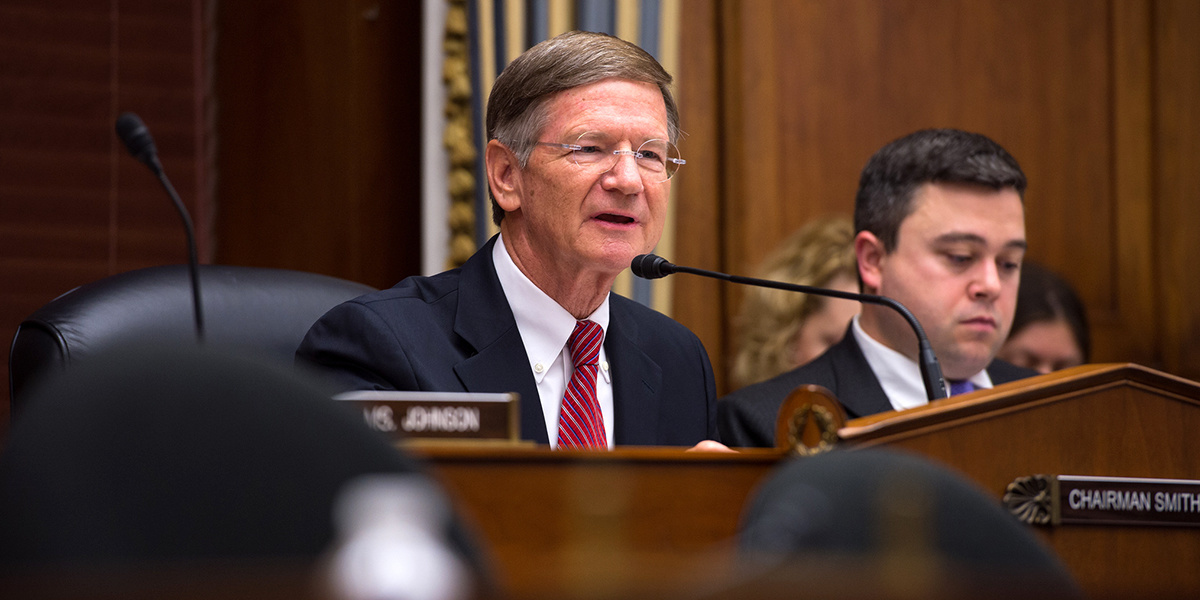
Science Committee Hearing Targets Cancer Scientists, Betrays Public Interest

By Carey Gillam
Score another point for corporate power over protection of the public.
U.S. Rep Lamar Smith (R-Texas), chairman of the U.S. House of Representatives Committee on Science, Space, & Technology, has slated a full committee hearing for Tuesday with an agenda aimed squarely at attacking some of the world’s top cancer scientists.
Given the fact that cancer is the second-leading cause of death in the U.S., it seems obvious that our lawmakers should be supporting cancer science rather than trying to thwart it. But Smith’s action comes after the World Health Organization’s International Agency for Research on Cancer (IARC) angered Monsanto Co. when it declared the pesticide glyphosate, a key ingredient in Monsanto’s weed killing products, to be a probable carcinogen.
Though the hearing is titled “In Defense of Scientific Integrity: Examining the IARC Monograph Programme and Glyphosate Review,” the irony of the descriptor is not lost on those who have been following Smith’s efforts to derail and defund this cancer research agency.
In letters to IARC’s leadership, Smith has repeated false narratives and inaccurate news stories planted by Monsanto and chemical industry allies, and cited the “serious nature of these concerns related to expenditures of taxpayer dollars.”
It’s worth noting that the plan to put the International Agency for Research on Cancer on the hot seat was put into motion roughly three years ago when Monsanto predicted the international cancer scientists would find its weed killer to have carcinogenic potential. The company said as much in internal communications brought to light through recent litigation.
The documents also show that it was February 2015, a month before the IARC classification, when Monsanto executives laid out a strategic plan to discredit the cancer scientists. The plan was designed to “orchestrate outcry with IARC decision.”
The efforts to manipulate public perception about IARC ramped up last summer when Monsanto allies spoon-fed a false narrative to a Reuters reporter who produced a news story that shot around the globe and has been a key talking point for the chemical industry attack against IARC.
The story relied on the deposition of an IARC scientist named Aaron Blair and reported that Blair withheld critical information that would have altered the IARC glyphosate classification. Reuters never provided a link to the deposition, which at that point was not filed in any court and was not publicly available.
Chairman Smith ran with the story, stating that Blair “admitted to knowing that this research could have prevented” the classification of glyphosate as a probable carcinogen.
Anyone taking time to actually read the deposition, which is now public, would see that Blair never said any such thing, and in fact protested multiple times that the data in question was not fully analyzed and not published and thus was not suitable to be considered by IARC.
A similar false narrative pushed by the chemical industry and repeated by Smith accused IARC of deleting assessments finding no connection between glyphosate and cancer from its final report. Smith and team either don’t know or don’t care that IARC’s deletions were of Monsanto assertions that the cancer scientists said could not be substantiated.
IARC officials have detailed the falsehoods perpetuated against them by the chemical industry but the defense has fallen on deaf ears.
Monsanto needs to discredit the international cancer scientists because it was the IARC finding that triggered waves of lawsuits against Monsanto, and prompted moves to ban the chemical in some European countries.
But while Monsanto and other chemical industry interests are concerned about the billions of dollars in revenues they rake in annually from glyphosate-based products, the attack on this independent science group should have all of us concerned.
Approximately 39 percent of men and women living in the U.S. are expected to be diagnosed with cancer during their lifetimes, according to the National Cancer Institute.
For this year alone, the American Cancer Society has estimated there will be more than 1.68 million people newly diagnosed with cancer and more than 600,000 deaths from cancer. Worldwide, there are more than 14 million cases of cancer occurring each year, and that number is expected to hit nearly 22 million by 2030.
Cancer “affects almost everyone’s life, either directly or indirectly,” and beyond the toll on life and health it costs the U.S. more than $200 billion in medical costs and lost productivity, according to the U.S. Department of Health and Human Services (HHS).
In order to reduce deaths from cancer, we have to put more emphasis on preventing it in the first place, and a big part of that “primary prevention” according to a 2016 report by the HHS National Toxicology Program “is to identify the carcinogens.”
Clearly, the companies that sell chemicals linked to cancer prefer to see IARC defunded and dismantled. They’ve said as much through the disingenuously named Council for Accuracy in Public Health Research, a nonprofit established by the American Chemistry Council a year ago with the specific goal of promoting the “reform” of IARC.
But to see our lawmakers so eagerly promoting corporate interests when such dire public safety interests are at stake marks perhaps a new low in American politics. These are literally life and death matters.
Our public servants must be held to account, to support the scientists who work to identify carcinogens, and push back against the corporate interests who want to discredit the science that threatens its profits.
Scientific integrity should mean exactly that.
Reposted with permission from our media associate Environmental Health News.

 233k
233k  41k
41k  Subscribe
Subscribe 